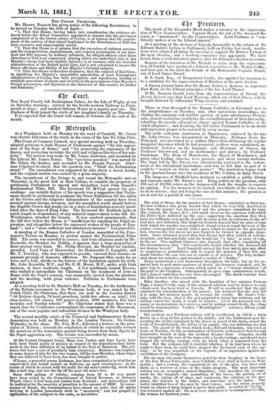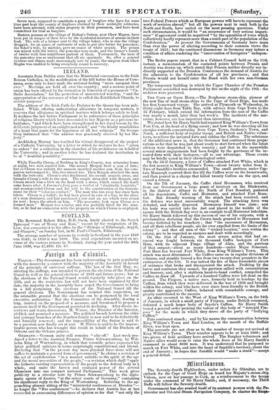Vroultuto.
The death of Sir Alexander Hood makes a vacancy in the representa- tion of West Somersetshire. Captain Hood, the son of the deceased Ba- ronet, is "mentioned" for the Conservatives. Lord Portman is "con- fidently spoken of on the Liberal interest."
At a meeting of the electors of Lincoln favourable to the return of Sir Edward Bulwer Lytton to Parliament, held on Friday last week, resolu- tions were adopted pledging the meeting to support Sir Bulwer Lytton at the next election ; and a working committee was appointed. 1 c have heard, from a well-informed quarter, that Sir Edward's election is certain.
Reports of the intention of Dr. Nicholl to retire from the representa- tion of Cardiff, have produced a Liberal requisition to Mr. Walter Coffin ; and have put on the alert the friends of the Honourable Captain Stuart, son of Lord James Stuart.
R. S. Gard, Esq., of Rougemont Castle, has signified his intention to be a candidate for the representation of Honiton at the next election.
A Sussex journal hints that Sir Henry Tufton is desirous to represent East Kent, on the Liberal principles of the late Lord Thanet.
If Mr. Stanton should retire from the representation of Stroud, the Bristol Journal says that Lord Moreton, eldest son of Earl Ducie, will be brought forward by influential Whig electors, and returned.
Three or four thousand of the Roman Catholics in Liverpool met in the Amphitheatre on Tuesday, and, after uproarious proceedings, in- cluding the summary and forcible ejection of some adventurous Protest- ants, passed resolutions justifying the reestablishment of their hierarchy ; rebutting the grossly calumnious charge against Roman Catholics of di- vided allegiance ; and declaring the bill before Parliament to be an insult and oppression proper to be resisted by every means.
The noble collegiate institution at Manchester, endowed by the lath Mr. John Owens, was inaugurated on Thursday. Professor Scott, the Principal, was prevented by a sudden illness from delivering the regular inaugural discourse which he had prepared ; so there were substituted, in- troductory lectures on the language and literature of Greece, by Professor Greenwood, and on mathematics and physics, by Professor Sandeman. The Dean of Manchester, the Mayor of Manchester, and many other leading citizens, were present, and about twenty students. The fund left by Mr. Owens was intentionally restricted to the endow- ment of the educational institution—and was so left that no part of it could be "wasted on bricks and mortar." The institution begins work in the spacious house once the residence of Mr. Cobden, in Quay Street.
The burgesses of Sheffield have declined to establish a public library and museum under Mr. Ewart's Act. Being polled on the question, only 298 out of 10,986 voters on the burgess-roll took the trouble to express an opinion. For the measure to be carried, two-thirds of the votes must be in its favour ; that not being the case in this instance, the question is set at rest for a period of two years.
The trial of Drory, for the murder of Jael Denny, concluded on Saturday. No new evidence was given beyond that which we very fully described at the time the murder was discovered and the prisoner committed for triaL His counsel, Mr. James, Q. C., laid much stress on the eagerness with which the Police have followed up the ease ; supporting his assertion that they have too willingly seen proofs of guilt in every point, by reference to the as/ tual fact, now undenied, that Inspector Coulson deposed that the piece of rope with which the murder was committed—found twisted round the neck of the
corpse—corresponded exactly with a piece which he found in the prisoner's box, whereas the two pieces are now found to be twisted in opposite direc- tions. Some witnesses proved that Jael Denny had often talked of self-de-
struction, and had generally said she would use "a line," or piece of rope,
in the act. Two medical witnesses also deposed, that after considering all the circumstances, they "felt considerable doubts whether the deceased did
not destroy herself." Lord Campbell advised the Jury not to give any effect to suspicions or probabilities, and to acquit the prisoner if they felt any doubt whether the case was one of suicide or of murder. The Jury deliber- ated about ten minutes, and returned a verdict of " Guilty." Drory maintained a cool demeanour throughout his trial ; but on his re- moval back to gaol under sentence of death, his firmness vanished, and he gave way to a paroxysm of tears, which ended in a "virtual admission " of his guilt to the Chaplain. Subsequently he gave some confirmatory details, but a formal confession has not been encouraged. The death-warrant fixes the 25th instant for his execution.
Eliza Smalley, who mixed with the breakfast of her mistress Frances Page, a farmer's wife, some of the arsenical solution used by farmers to soak wheat-seed, has been tried at Lincoln. It will be recollected that the girl
admitted the administration of the poison ; but declared that she only did it to make her mistress poorly, in revenge for cruelty. Mr. Justice Cole-
ridge told the Jury, that if the girl purposed to injure her mistress, and by mishap caused her death, it would be murder ; but if she purposed only to annoy or inconvenience her mistress, and by mishap caused death, the crime would be manslaughter. Verdict, "Manslaughter" : sentence, fifteen years' transportation.
The accident on a Northern railway will be recollected, in which a train drawn up a steep incline parted in the middle, and the hindermost part de-
scending the incline unmissed by the driver or guard of the train, caused the death of Joseph Garrick, the driver of an engine, who was following the first train. The guard of the train which broke, Edward Grimston, was tried at
York, on Tuesday, for the manslaughter of Garlick, as it seemed that through Grimston's breach of duty the accident became fatal. Grimston should have brought up the rear of the train with a break-carriage, and should have
stopped the receding carriage with his break when it separated from the tram. But the evidence left it doubtful whether, if he had been where he ought to have been, he could have stopped the backward rush of the car- riage : so he was acquitted—at the expense of an imputation against the carefulness of the Company.
The six men who made themselves noted by their burglary in the house of the four Misses Farucombe, near Uckfield, were tried at Lewes on Wed- nesday; and a woman, the companion of one of the men, was tried with them, as a receiver of some of the stolen property. The most important witness was an accomplice named Hamilton ; who described the arrange-
ment for the burglary—the assembling of the forces, the putting on of masks, the taking off of shoes and waistcoats, the entering on the pre- mises, the violence to the butler, and terrorism over the ladies. The butler identified two of the men by their voices ; and the stolen property found on others of them helped to prove their guilt. A verdict of "Guilty " was returned against all : the men were sentenced to be transported for life, the woman for fourteen years.
Seven men, supposed to constitute a gang of burglars who have for some time past kept the county of Anglesea alarmed by their midnight robberies, have been 'wrested, with stolen property in their possession, and have been committed for trial as burglars.
Sixteen persons at the village of Bishop's Sutton, near Chew Magna, have been put in danger of their lives by the accidental mixture of arsenic in their food. The wife of a farmer sent to the village baker, who is also the village druggist, for an ounce of carbonate of soda to put into batter for pancakes; the baker's wife, by mistake, gave an ounce of white arsenic. The poison was mixed with the batter, the pancakes were made and the farmer's family of twelve with four neighbours partook of them. Fortunately, the taste of the pancakes was so unpleasant that all ate sparingly. So, alter a general sickness and illness made increasingly sore by panic, the surgeon from Chew Magna was enabled to bring everybody round to recovery.



























 Previous page
Previous page